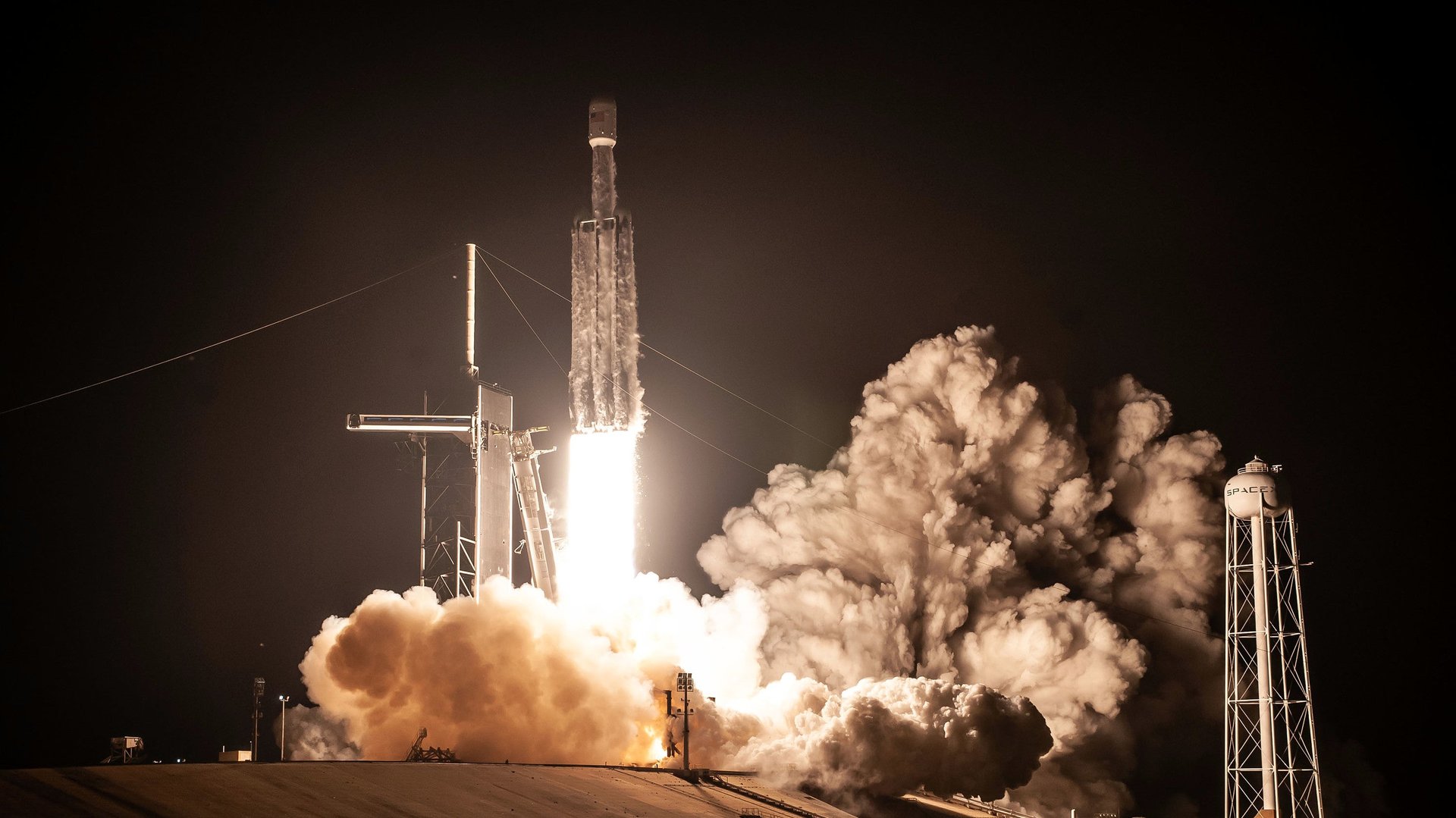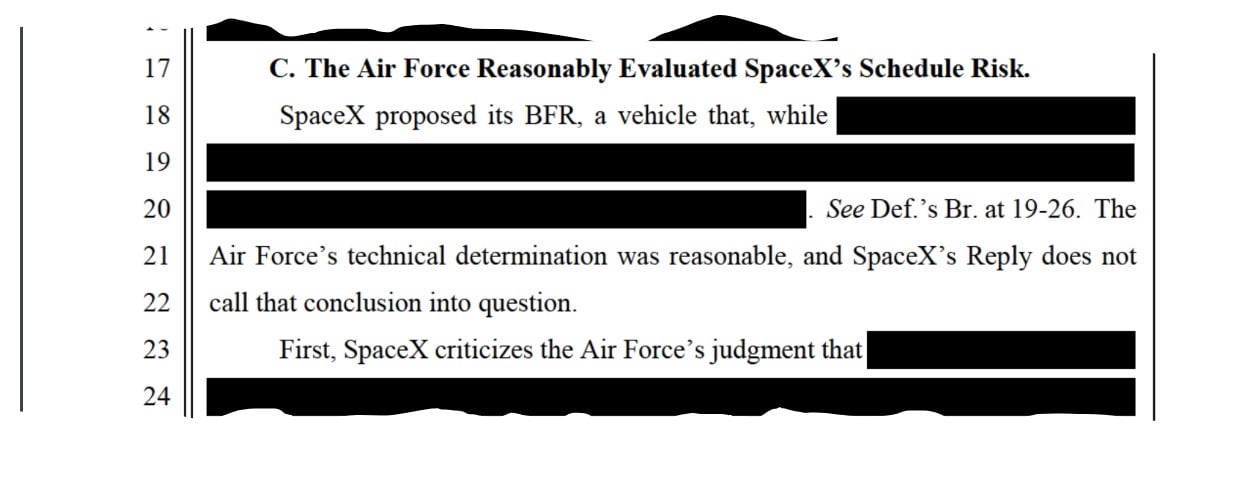Why SpaceX is silent about winning a huge military contract
We’ve (almost) found something Elon won’t tweet about.


We’ve (almost) found something Elon won’t tweet about.
SpaceX won a major coup last week after years of effort—a contract to launch about a dozen spacecraft for the US Space Force in the next five years, worth well north of a billion dollars.
It could be seen as the crowning moment of a very good summer for Elon Musk’s rocket company. Neither SpaceX nor its voluble CEO, however, has had anything to say about it in the six days since the award was announced, unlike other participants in the bid.
Blue Origin, Jeff Bezos’ space company, and Northrop Grumman, both of which saw their bids fail, expressed disappointment and confidence in their technologies. United Launch Alliance, the Boeing-Lockheed Martin joint venture that won about 19 launches in the contract, took a victory lap.
Update: In a tweet responding to this story, Musk said “efficiently reusable rockets are all that matter for making life multiplanetary & ‘space power’. Because their rockets are not reusable, it will become obvious over time that [United Launch Alliance] is a complete waste of taxpayer money.”
“Nobody would suggest buying airplanes that only fly once & then crash into the ocean. That would be absurd,” the SpaceX founder added later. “So why is this madness acceptable for Boeing/Lockheed rockets?”
The booster for SpaceX’s primary rocket, the Falcon 9, and spacecraft, the Dragon, are reusable, a technology SpaceX pioneered in the private sector. ULA’s current rockets are only used once.
One reason Musk’s firm waited to weigh in may be that have yet to receive an official debrief explaining how the decision was reached. As of Aug. 11, ULA CEO Tory Bruno said his company hadn’t received one. Neither SpaceX, the Department of Defense nor US Space and Missile Systems Command responded to questions about the status of the debrief.
Another potential reason? SpaceX is still suing the United States over the precursor to this award, and might be inclined to do the same over this decision. In 2018, the US gave the other three competitors, but not SpaceX, some $2.3 billion in funding to develop new launch vehicles ahead of the final selection. SpaceX sued, culminating in a July hearing that has a California federal judge mulling over the final decision.
Much of that lawsuit is sealed to protect the competitive secrets of SpaceX and the other bidders, but redacted filings—here’s SpaceX’s Complaint (pdf) and the US government response (pdf)—give us a clue about what Musk and company are upset about. Recall that an inciting incident for buying new rockets was a law enacted in 2014 to end the use of Russian RD-180 rocket engine, which was relied upon by ULA. At that time, ULA held a monopoly on US rocket launches that SpaceX broke, eventually helping save the government $7 billion.
SpaceX complains that the Air Force (the decision was made pre-Space Force) didn’t follow its own rules for the 2018 procurement, in part because it will allow ULA to use 12 Russian engines remaining in its stockpile until ULA’s new rocket, Vulcan, comes online. SpaceX also suggested that government didn’t correctly analyze the risk of its competitors failing to deliver its rockets on time, and questioned whether shared components among the three other bidders could really produce two redundant launch vehicles, as envisioned by lawmakers. SpaceX also maintains that the Air Force underestimated the cost of those rockets, while overestimating SpaceX’s costs.
And perhaps most intriguing, the Air Force didn’t agree with SpaceX’s estimate that it would be ready to fly a next generation vehicle (now known as Starship and then as “BFR,” for Big Falcon Rocket) within five years. The service and SpaceX also disagreed about whether the Space Shuttle was a good analogy to the new vehicle.

The ultimate decision to give SpaceX one of the two launch contracts puts this litigation in an interesting place. As lawyers for SpaceX’s rivals point out, winning the contract with its existing rockets suggests SpaceX did not require the development funding it initially sought. SpaceX might reply that it shows the government wasted money on rockets it ultimately chose not to buy.
Another outcome, vacating the development contracts retroactively for unfairness, would be a large problem for SpaceX competitors and potentially their customers, including the Space Force. Will Roper, the Pentagon official in charge of the procurement, emphasized that the government sees this procurement as an opportunity to boost competition in the US space industry and maintain its advantage over rivals like China.
Regardless its ongoing lawsuit, SpaceX may be contemplating a new challenge to the Space Force’s final decision to give 60% of the upcoming flights to ULA, versus the 40% it was awarded. That’s a rough difference of six launches, which represents a significant chunk of revenue for any launch company, especially one with an expensive research and development agenda.
Still, the rates being paid by the Air Force may be designed to discourage complaints: SpaceX’s first launch under the new contract will cost the government $316 million. That mission is classified, but we can assume it uses SpaceX’s larger, most expensive rocket, the Falcon Heavy—which cost just $130 million when the US Air Force last bought it two years ago.
A version of this story was first published in Quartz’s Space Business newsletter.